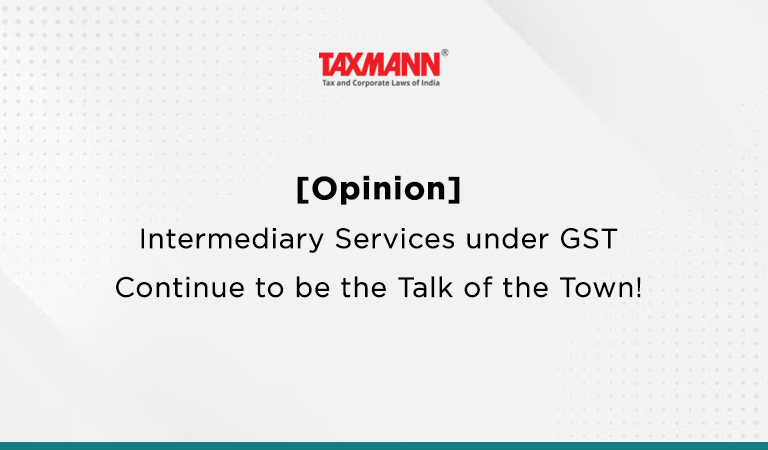[Opinion] Intermediary Services under GST Continue to be the Talk of the Town!
- Blog|News|GST & Customs|
- 2 Min Read
- By Taxmann
- |
- Last Updated on 1 May, 2023

Brijesh Kothary & Saundarya Sinha – [2023] 149 taxmann.com 468 (Article)
Introduction
Intermediary Services is an old concept which was defined in the Service Tax Education Guide, at the time of introduction of negative list regime in erstwhile Service Tax law. The definition was further amended in July 2014 and the legacy has been carried in the Goods and Services Tax regime along with the dispute. “Intermediary Services” was introduced with a motive to tax cross-border transactions of services provided to persons situated outside India but performed within the territory of India.
Background
Recently in the case of Dharmendra M Jani v. Union of India [2023] 149 taxmann.com 317 (Bom.) the constitutional validity of Section 13(8)(b) and Section 8(2) of the IGST Act was challenged. The court, vide its reference order, held that the provisions of Section 13(8)(b) and Section 8(2) of the IGST Act are legal, valid, and constitutional, provided that the Section 13(8)(b) and Section 8(2) are confined in their operation to the provisions of the IGST Act only and the same cannot be made applicable for the levy of tax on services under the CGST and the State GST Acts.
The decision has resurfaced the uncertainty pertaining to the nature of tax payable for intermediary services in the industry. In this article, we wish to analyse the judgment along with its implications and way forward for the industry.
Before diving into the topic, it becomes pertinent to understand the brief background of the subject case. The Division Bench of the Bombay High Court had expressed different opinions over the constitutional validity of the said provisions of the Act. Therefore, the proceedings were placed before the Hon’ble Chief Justice. Consequent thereto, by an order passed by the Hon’ble Chief Justice, the proceedings were referred to the Bombay High Court in the present case. The court settled the issue by holding that the said provisions are legally valid and constitutional, and the matter was placed back to the Division bench which had pronounced dissenting opinion, to settle the issue.
The doubt that now arises is whether the Division Bench will pass a fresh order on the basis of the ratio and principles laid down in the reference order. In case the order is passed on the basis of the ratio and principles laid down in this order, would it be safe to say that IGST is leviable in the cases of intermediary services? Secondly, in the event that the order is passed, and the nature of tax is clarified to be IGST in the case of intermediary services, whether the departmental authorities will continue their practise of issuing a circular and regularising the matter on “as is” basis?
Click Here To Read The Full Article
Disclaimer: The content/information published on the website is only for general information of the user and shall not be construed as legal advice. While the Taxmann has exercised reasonable efforts to ensure the veracity of information/content published, Taxmann shall be under no liability in any manner whatsoever for incorrect information, if any.

Taxmann Publications has a dedicated in-house Research & Editorial Team. This team consists of a team of Chartered Accountants, Company Secretaries, and Lawyers. This team works under the guidance and supervision of editor-in-chief Mr Rakesh Bhargava.
The Research and Editorial Team is responsible for developing reliable and accurate content for the readers. The team follows the six-sigma approach to achieve the benchmark of zero error in its publications and research platforms. The team ensures that the following publication guidelines are thoroughly followed while developing the content:
- The statutory material is obtained only from the authorized and reliable sources
- All the latest developments in the judicial and legislative fields are covered
- Prepare the analytical write-ups on current, controversial, and important issues to help the readers to understand the concept and its implications
- Every content published by Taxmann is complete, accurate and lucid
- All evidence-based statements are supported with proper reference to Section, Circular No., Notification No. or citations
- The golden rules of grammar, style and consistency are thoroughly followed
- Font and size that’s easy to read and remain consistent across all imprint and digital publications are applied



 CA | CS | CMA
CA | CS | CMA
